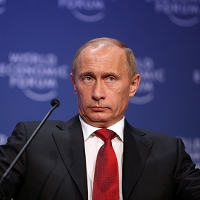There Will Be No Reintegration
October 7, 2011 -
Andrzej Brzeziecki
-
Bez kategorii

putin02_World Economic Forum_s.jpg
In Russia, the most important political decisions are made without public knowledge. Popular slogans are usually meaningless rubbish.
That is why, Vladimir Putin’s recent article in the daily, Izvestia, cannot be regarded as anything else but a strong statement of his planned return to the Kremlin. Putin is coming back in a big way. Putin’s return to the Kremlin is real but it does not mean that the Soviet Union will also return. After 20 years of the collapse of the Soviet Union and an unsuccessful reanimation of the empire during the talks in Novo-Ogaryovo, Moscow is quite disconnected from its peripheries.
No more than 20 years ago, the Soviet/Russian soldiers were stationed in Germany and Poland (the truth is that they were already packing their bags even though they were not sure what their next destination was). Central Europe quite rapidly became independent from the Empire. The Commonwealth of Independent States is made up of fewer former Soviet-republics than the USSR would have hoped for (the Baltic States refused participating in it, Turkmenistan did not ratify the agreement, and in 2008 Georgia broke away.) The recently established Customs Union has even fewer members. Moscow has failed to convince any of the former republics to recognise Abkhazia and South Ossetia.
So what would this integration look like? Would these unrecognised territories be excluded from it? This is absurd. And yet it would be quite difficult for them to be in one organisation with countries who do not regonise their existence…
Russia has attempted to keep its former republics through various means. When it tried to exploit the issues of natural resources, this led to gas wars with Ukraine and Belarus (which built their political capital on Soviet nostalgia). When Russia used her tanks to put Georgia in order, it frightened other European countries so much, that they all accepted the Eastern Partnership programme.
Leaders of Eastern European countries govern independent states. They are usually authoritarian leaders. That is why it is easier for them to find a common language with the authoritarian Kremlin, though it does not automatically mean that they would like to share their power with the Kremlin. Their alternatives are the European Union, Turkey, China and the US – the last two are particularly active in Central Asia. Today, Russia is not fully capable of controlling its own territory. The North Caucuses is already called the “internal border”.
As the economic crisis is continuing to trouble Western countries, there is little chance that they will start investing, economically or politically, in remote and poor Eastern European countries. The crisis is also having a negative effect on Russia and Putin does not seem to have many cards left up his sleeve. In this situation what can he promise to his former fellow citizens?
He has no choice but to write articles.
Andrzej Brzeziecki is Editor-in-Chief of New Eastern Europe and Nowa Europa Wschodnia.
Translated by Iwona Reichardt


































